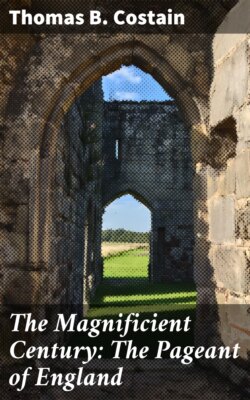Читать книгу The Magnificient Century: The Pageant of England - Thomas B. Costain - Страница 16
2
ОглавлениеQueen Isabella had left England in July 1217, returning to the peace of the high-walled city of Angoulême which had been her home until John saw her and stole her away from the man to whom she had been pledged, Hugh of Lusignan. Her purpose was to visit her seven-year-old daughter, Joanna. The little princess, who was a beautiful child and blessed with a perfect disposition which she could not have inherited from either of her parents, was to marry in due course of time this same Hugh of Lusignan, who was now the Count of La Marche. In his disappointment over the fair Isabella, handsome Hugh le Brun (the Brown) had remained without a wife, and it was through sentimental regard for his old sweetheart that he had accepted Joanna as his future bride in return for assistance to John in one of the latter’s abortive campaigns in France. The child was being educated in one of his castles.
Count Hugh was away crusading when Isabella arrived. The Lusignans had played an important part in the struggle for the Holy City, and one of them had been King of Jerusalem. Hugh returned before the end of her visit, browner than ever, and he realized at once that his love for her had not lessened with the years. This was not surprising, for the royal widow at thirty-four was still beautiful, as lissome as ever, her manner gay and seductive. A troubadour would have compared her to a ripe peach hanging on a sun-kissed wall in Provence or an earth-bound spirit of beauty. Why should he wait seven or eight years more while the little Joanna grew up? Here was the lady of his first choice, free and obviously willing. He held out his arms and Isabella walked right into them.
They were married without waiting for the consent of the King’s Council in England. This was a mistake. The Council had the power to say whom she should marry or whether she should marry at all. As the second matrimonial ventures of queens are supposed to be dictated by political expediency, it was certain they would not have selected Hugh le Brun for her. They promptly confiscated all her dower lands and stopped the payment of her pension.
Isabella and her devoted Hugh were highly indignant over this. Hugh was in love with his wife, but he was also very much attached to her broad acres and the handsome jointure she was supposed to receive each year. He demanded satisfaction and made many threats against the men who composed the Council. The little princess had not been returned to England, and this provided the pair with a weapon. They announced they would not let her go until the Council relented and handed back the castles which had been the Queen’s dower right and the fat and fruitful lands which had gone with them. This threw the Council into an equal state of indignation, and a letter was sent to the Pope, signed by the boy King, requesting the Pontiff to excommunicate his mother and her new spouse, to curse them, as the papal bans read, “within and without, sleeping or waking, going and sitting, standing and riding, lying above ground and under water, speaking and crying and drinking, in water, in field, in town.” It happened that, on finding the princess had been freed from her troth, the Council had started negotiations to give her as wife to King Alexander, the Red Fox of Scotland, and thereby cement the peace between the two countries. Joanna not being available, the Council wanted to substitute the tiny Princess Eleanor. Alexander would have none but the oldest daughter of the royal line, and so the Council was compelled, most reluctantly, to come to terms. Isabella received in compensation for her dower lands in Normandy the stanneries in Devon and the revenue of Aylesbury for a period of four years. She received the sum of three thousand pounds as payment for arrears in her pension.
To cast ahead, Joanna was married to Alexander at York in the year 1221. The little Queen won the affections of the Scottish people, who called her Joan Makepeace because her coming had brought about a cessation of hostilities between the two countries. She died in her twenty-eighth year and was deeply mourned by her husband and the people.
Isabella was happy for a time in her second marriage, presenting her husband over the years with eight children. She had been a queen, however, and could not reconcile herself to the rank of a mere countess. Her dissatisfaction grew with the years and led, as will be recorded later, to much trouble for her husband and her son, and much unhappiness for the people of England.
